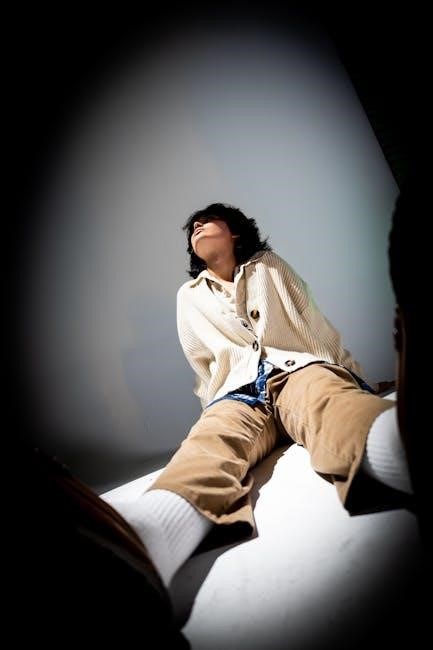
babel rf kuang pdf
Babel by R.F. Kuang is a captivating blend of historical fiction and fantasy, set in an alternate 19th-century Oxford. It explores themes of colonialism, language, and power through the story of Robin Swift, a Chinese boy navigating the magical and political tensions of Babel, the world’s center of translation and silver-working magic;
Overview of the Book
Babel by R.F. Kuang is a speculative fiction novel set in an alternate 19th-century Oxford, blending historical and magical elements. It follows Robin Swift, a Chinese orphan, as he navigates the prestigious Royal Institute of Translation, exploring themes of colonialism, language, and power amidst the backdrop of the Opium Wars and Britain’s imperial ambitions.
Publication Details
Babel: Or the Necessity of Violence: An Arcane History of the Oxford Translators’ Revolution was published in 2022 by Harper Voyager. The novel spans 544 pages and is categorized under fantasy and historical fiction. Author R.F. Kuang, known for her debut The Poppy War, delivers a unique blend of speculative elements and historical context. The book explores themes of colonialism and language through a fantastical version of 19th-century Britain. Its ISBN-10 is 57945316, and ISBN-13 is 9780063021426. This work has garnered significant attention for its dark academia style and nuanced portrayal of imperial power dynamics.
Genre Classification
Babel by R.F. Kuang is a speculative fiction novel that seamlessly blends fantasy and historical fiction. Set in an alternate 19th-century Britain, it incorporates magical elements like silver-working and historical events such as the Opium Wars. The book falls under the dark academia genre, exploring themes of power, colonialism, and language. Its unique mix of real-world history and fantastical elements makes it a standout in both fantasy and historical fiction categories. Critics have praised its nuanced portrayal of imperialism and its ability to merge genres while maintaining a compelling narrative. This classification highlights its appeal to fans of both genres.
Setting
Babel is set in an alternate version of 1830s Oxford, England, where the Royal Institute of Translation, known as Babel, harnesses magical silver-working to fuel British imperialism. This fantastical Oxford is a hub of academic and magical prowess, where translation is not only an art but also a tool of colonial power. The story weaves between the prestigious halls of Babel, the shadowy operations of the Hermes Society, and the broader backdrop of the First Opium War. This setting blends historical accuracy with speculative elements, creating a rich, immersive world that critiques the dark underpinnings of colonialism and academic ambition.
Plot Summary
Babel follows Robin Swift, a Chinese boy in 19th-century England, as he enrolls in Oxford’s Royal Institute of Translation. Torn between loyalty to Babel and the Hermes Society, Robin confronts the dark side of colonialism and the power of language, leading to a clash between tradition and revolution.
The World of Babel
Babel is set in a fantastical version of 19th-century Oxford, where silver magic fuels the British Empire’s colonial ambitions; The Royal Institute of Translation, known as Babel, harnesses “silver-working,” a mystical art that manifests lost meanings in translation using enchanted silver bars. This magic underpins Britain’s dominance, enabling unparalleled power and control. The world of Babel blends historical accuracy with speculative elements, exploring how language and translation serve as tools of imperialism. Robin Swift navigates this intricate world, where knowledge and power are deeply intertwined, and the costs of colonialism are starkly evident.
Robin Swift’s Journey
Robin Swift, an orphaned Chinese boy raised in Britain, is recruited by Professor Lovell to attend Oxford’s Royal Institute of Translation, known as Babel. Trained in Latin, Ancient Greek, and Chinese, Robin excels academically but grapples with his dual identity. As he delves deeper into Babel’s secrets, he becomes torn between loyalty to the institution and his growing resentment of its role in perpetuating colonialism. Robin’s journey is one of self-discovery, as he confronts the moral ambiguities of Babel’s power and the violent resistance of the Hermes Society, ultimately questioning whether change can be achieved without destruction.
The Hermes Society
The Hermes Society is a shadowy organization opposing Babel, dedicated to dismantling its imperialist ties and the exploitation of silver-working magic. Emerging as a resistance force, they seek to disrupt Babel’s control over translation and its role in perpetuating British colonial dominance. Through sabotage and subversion, the Society challenges the institution’s power, drawing Robin Swift into a moral dilemma. Their enigmatic presence adds layers of tension, as Robin grapples with whether their radical methods justify the cause. The Hermes Society’s influence becomes a catalyst for Robin’s internal conflict, questioning the ethics of Babel’s authority and the true cost of resistance.

Main Characters
Robin Swift, a Chinese orphan raised in Britain, is the protagonist, torn between loyalty to Babel and his heritage. Professor Lovell, his mentor, hides motives. Other key characters include fellow students and members of the Hermes Society, each playing crucial roles in the conflict.
Robin Swift
Robin Swift, a Chinese orphan, is brought to London by Professor Lovell and trained in languages to join Babel. Torn between loyalty to Babel and his heritage, Robin struggles with identity and morality. His journey explores the cost of serving an empire that exploits his homeland, highlighting his internal conflict and growth amidst colonial tensions and magical intrigue.
Professor Lovell
Professor Lovell is a mysterious figure who rescues Robin Swift from Canton and mentors him in languages, preparing him for Babel. His motives are complex, blending paternal care with a hidden agenda tied to the institution’s power. Lovell’s influence shapes Robin’s early years, setting the stage for his eventual conflict between Babel’s expectations and his own identity.
Other Key Characters
Several other characters play pivotal roles in Robin’s journey. Ramy, Victoire, and Lettie are fellow students at Babel, each with unique skills and backgrounds that shape the group’s dynamics. Ramy, charismatic and brilliant, often challenges authority, while Victoire, sharp-witted and rebellious, harbors secrets about her past. Lettie, though reserved, possesses a deep understanding of silver-working. Together, they form a tight-knit group navigating the pressures of Babel. Additionally, the enigmatic figures of the Hermes Society, who oppose Babel’s imperialistic practices, add layers of tension and moral complexity to the narrative.

Themes
Babel explores themes of colonialism, language as power, identity, and resistance, delving into the moral complexities of imperialism and cultural suppression through its narrative.
Colonialism and Imperialism
Babel critically examines the exploitative nature of colonialism, highlighting how the British Empire uses translation and silver-working magic to exert control over colonized nations. The novel portrays the Empire’s expansion as inherently violent, with language serving as both a tool of domination and cultural erasure. Robin Swift’s internal conflict—torn between loyalty to Babel and his Chinese heritage—underscores the personal and societal costs of imperialism. Through its alternate history lens, Babel challenges readers to confront the moral ambiguities of colonial power and the enduring impact of historical exploitation, blending fantasy with sharp political commentary.
Language and Power
Babel explores the intricate relationship between language and power, revealing how translation serves as both a bridge and a weapon. The novel highlights the phrase “Traduttore, traditore” (Translator, traitor), emphasizing the inherent betrayal in translation, where cultural nuances are lost or distorted. Silver-working magic, which manifests meaning lost in translation, becomes a tool of British imperialism, enabling the Empire to dominate through linguistic control. Robin Swift’s journey illustrates the personal cost of this system, as he grapples with the moral implications of wielding language for power. The novel underscores how language shapes identity and perpetuates inequality, blending fantasy with a searing critique of linguistic imperialism.
Identity and Belonging
Babel delves into the complexities of identity and belonging through Robin Swift’s journey as a Chinese boy in Britain. Raised in a society that values imperial dominance, Robin struggles with his dual heritage, feeling alienated from both his British upbringing and his Chinese roots. His enrollment in Babel intensifies this internal conflict, as he becomes a symbol of the Empire’s reach while grappling with loyalty to his motherland. The novel explores how colonialism erases identities, forcing individuals to navigate between cultures, ultimately questioning whether belonging can coexist with resistance and self-preservation in a world shaped by imperial power.

Historical Context
Babel is set in an alternate 19th-century Britain, drawing inspiration from the Opium Wars and colonial exploitation. The novel reimagines historical events to explore the costs of imperialism and cultural erasure, blending real-world conflicts with its fantastical elements.
The Opium Wars
Babel delves into the historical backdrop of the Opium Wars, highlighting Britain’s exploitation of China through the opium trade. The novel portrays how these conflicts fueled imperial ambitions and the unethical practices of the British Empire; R.F. Kuang weaves these real-world events into the fictional narrative, illustrating the consequences of colonial greed and the resistance it sparked. The Opium Wars serve as a catalyst for the tensions Robin Swift faces, bridging the gap between historical fact and the fantastical elements of the story. This historical context enriches the narrative, providing depth to the themes of power and resistance. By incorporating these events, Kuang underscores the lasting impact of colonialism and the moral dilemmas it created.
19th-Century Britain
Babel is set against the backdrop of 19th-century Britain, a time of industrial progress and colonial dominance. The novel reimagines this era with a fantastical twist, where magic, particularly silver-working, is deeply intertwined with imperial power. Britain’s pursuit of knowledge and expansion is portrayed as a double-edged sword, driving innovation while perpetuating inequality. The setting captures the societal tensions of the time, blending historical accuracy with speculative elements. This alternate version of 19th-century Britain serves as a commentary on the era’s colonial ambitions and the ethical dilemmas they engendered, providing a rich backdrop for Robin Swift’s journey and the conflicts he faces. The interplay of tradition and progress underscores the novel’s exploration of identity and power.

Magic System
Babel’s magic revolves around silver-working, where enchanted silver bars manifest lost meanings in translation. This arcane system fuels British imperialism and sparks the Oxford Translators’ rebellion against its ethical costs.
Silver Working
Silver working in Babel is a magical art where enchanted silver bars manifest lost meanings during translation. This system is central to the British Empire’s power, enabling them to dominate globally through precise communication. However, it also perpetuates colonial exploitation, as the magic enforces linguistic and cultural dominance. Robin Swift and other translators grapple with the ethical implications, realizing that their craft, while powerful, serves imperialistic goals. The magic’s reliance on silver underscores its connection to wealth and control, making it both a tool of progress and oppression in Kuang’s intricate world-building.
Lost in Translation
In Babel, the concept of “lost in translation” is a recurring theme, reflecting the inevitable betrayal that occurs when languages and cultures collide. Robin Swift’s journey highlights how translation, while bridging gaps, often distorts meanings, erasing cultural nuance. This idea is central to the novel’s critique of colonialism, where language becomes a tool of dominance. The tension between preserving cultural identity and serving imperial ambitions underscores Robin’s internal conflict. Kuang masterfully explores how translation can both unite and divide, resonating with the real-world struggles of cultural erasure and the power dynamics inherent in language.
Reception and Reviews
Babel has received widespread critical acclaim for its innovative blend of fantasy and historical fiction, with praise for its sharp critique of colonialism and linguistic power dynamics.

Critical Acclaim
Babel has garnered widespread critical acclaim for its masterful blend of historical fiction and fantasy. Reviewers praise its razor-sharp critique of colonialism, linguistic power, and cultural identity. Shannon Chakraborty hailed it as “absolutely phenomenal,” noting its interrogative approach to history. The novel’s dark academia tone and nuanced exploration of imperialism have resonated deeply with readers. Many commend Kuang’s ability to weave speculative elements with historical accuracy, creating a compelling narrative that challenges traditional genre boundaries. The book’s thematic depth and intricate world-building have solidified its place as a standout in contemporary fantasy literature, earning it a spot as an Instant New York Times Bestseller.
Audience Response
Readers worldwide have embraced Babel, praising its unique narrative and thought-provoking themes. Many highlight the novel’s ability to balance academic intrigue with fantasy elements, resonating particularly with fans of dark academia. The exploration of colonialism and identity has struck a chord, sparking discussions across social media and book clubs. Audience members appreciate the morally complex characters and the book’s unflinching examination of power structures. The PDF version has been widely downloaded, reflecting its popularity. Overall, Babel has left a lasting impact, solidifying its reputation as a must-read in speculative fiction.
Writing Style
Babel by R.F. Kuang features a dark academia style, blending fantasy with historical elements. The narrative explores colonialism and identity through a rich, atmospheric prose that captivates readers.
Dark Academia
Babel by R.F. Kuang embodies the dark academia genre through its exploration of power dynamics and moral ambiguity within Oxford’s prestigious Royal Institute of Translation. The novel delves into the intense academic environment, where students grapple with the weight of knowledge and its consequences. Kuang’s vivid portrayal of the institution’s secrets and the pressures faced by its scholars creates a haunting atmosphere, blending intellectual rigor with the darker aspects of ambition and colonialism. This style immerses readers in a world where the pursuit of knowledge is intertwined with power and deceit, making it a quintessential dark academia tale.
Blending Fantasy and History
Babel masterfully blends historical fiction with fantasy, setting its narrative in an alternate 19th-century Oxford. The novel incorporates real historical events like the Opium Wars and British colonial expansion, weaving in fantastical elements such as silver-working magic and the Oxford Translators’ Revolution. By merging these elements, Kuang creates a unique lens through which to examine colonialism, language, and power. The historical context provides a rich backdrop, while the magical system of silver-working adds depth and critique to the narrative, allowing readers to explore complex themes in a speculative yet familiar setting.

Cultural Significance

Babel holds profound cultural significance as it challenges traditional historical narratives and fantasy genres. R.F. Kuang’s work brings marginalized voices to the forefront, offering a fresh perspective on colonialism and identity; By blending speculative elements with real historical contexts, the novel critiques power structures and linguistic domination, resonating deeply with readers seeking diverse storytelling. Its exploration of translation, culture, and resistance has made it a landmark in contemporary speculative fiction, inspiring conversations about representation and the legacy of empire. Kuang’s unique voice and academic background add authenticity, making Babel a culturally impactful and thought-provoking read.